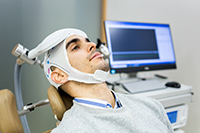Noninvasive brain stimulation improves alcohol use disorder
VA Research News Briefs

Photo for illustrative purposes only. ©iStock/Jesus Rodriguez
(03/21/2025) VA Sierra Pacific MIRECC researchers showed noninvasive brain stimulation can reduce heavy drinking in patients with alcohol use disorder (AUD). Forty-nine Veterans with AUD received either 20 sessions of intermittent theta burst stimulation (iTBS) – a noninvasive treatment in which short magnetic pulses are delivered to specific brain regions – over two weeks or a sham treatment, and their alcohol consumption was tracked for six months after treatment. The group who received iTBS had 4.4 times greater odds of continued alcohol abstinence over six months. For those who did start drinking again, the iTBS group had fewer days in which they drank alcohol and a lower number of alcoholic drinks on days they did drink. Participants did not show any negative effects from iTBS. The results suggest this method of brain stimulation can effectively reduce heavy drinking and improve clinical outcomes for people with AUD. (Drug and Alcohol Dependence, Mar. 1, 2025)


 Photo for illustrative purposes only. ©iStock/Jesus Rodriguez
Photo for illustrative purposes only. ©iStock/Jesus Rodriguez